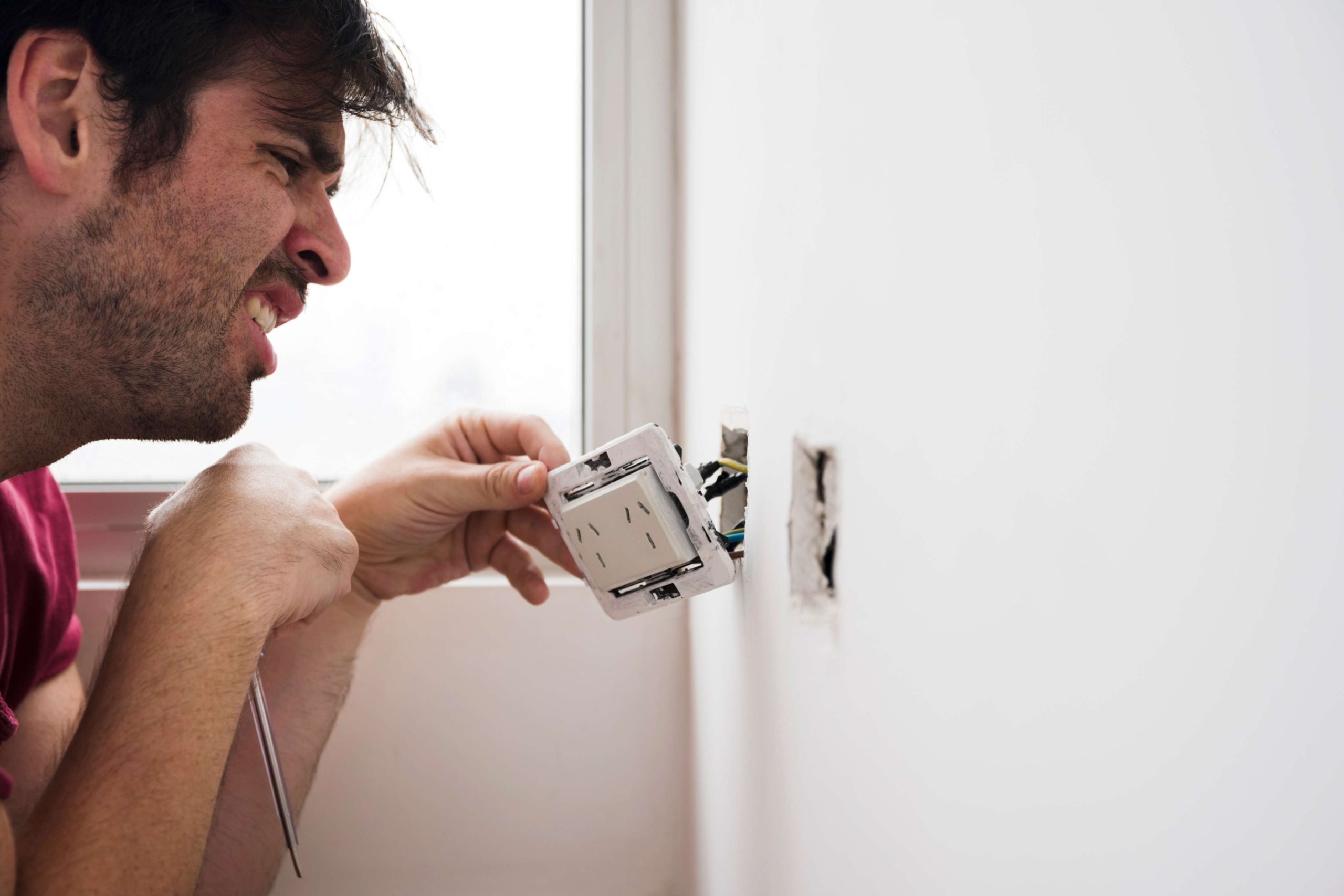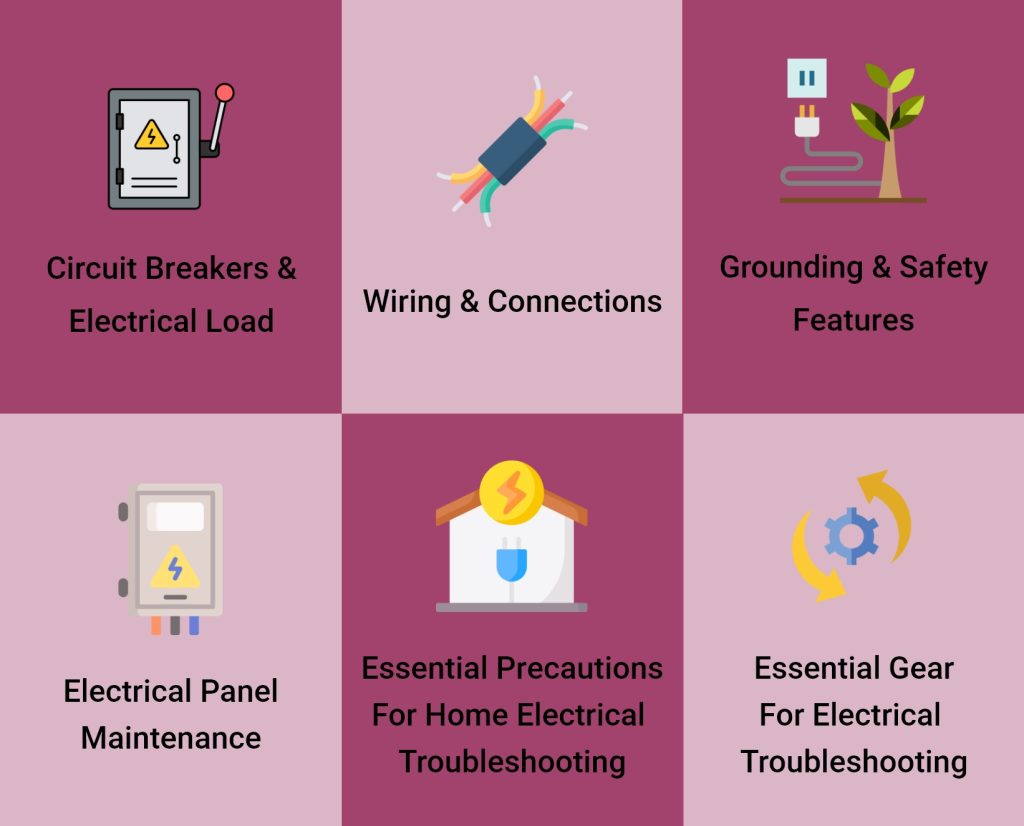 Last updated: July 30th, 2024
Last updated: July 30th, 2024
The Ultimate Guide to Electrical Maintenance for Homeowners

A safe and efficient electrical system is the backbone of a comfortable and functional home. However, electrical problems can pose safety hazards and disrupt your daily routine. This comprehensive guide empowers you with the knowledge to perform basic electrical maintenance tasks and identify situations requiring a qualified electrician.
Understanding Your Electrical System
Understanding its core components empowers you to troubleshoot minor issues, prioritize safety, and ensure your home runs smoothly. This section delves into the essential elements that keep your electrical system humming.
a. The Power Grid Connection
- Service Entrance: When electricity from the utility company enters your property. This connection typically involves overhead or underground wires and a meter that tracks electricity usage.
b. The Electrical Panel (Breaker Box)
- Function: The central control hub of your home’s electrical system. It houses numerous circuit breakers, each dedicated to a specific circuit.
- Circuit Breakers: Act as guardians, safeguarding your electrical system from overload. When a circuit experiences excessive current flow (amperage), the breaker trips, cutting off power to that circuit and preventing potential damage or fire.
- Main Breaker: The master switch that controls the entire electrical system in your home.
c. Power Distribution: Circuits & Wiring
- Circuits: Divided electrical pathways originating from the breaker panel. Each circuit supplies power to a specific area or set of appliances in your home (e.g., kitchen circuit, lighting circuit, bathroom circuit). Circuits are designed for a specific amperage capacity, ensuring they can handle the electrical load without overloading.
- Wiring: The invisible network of insulated cables that carry electricity throughout your home, connecting the electrical panel to outlets, switches, and appliances. Different wire gauges (thicknesses) are used depending on the circuit’s amperage requirements.
d. The User Interface: Outlets & Switches
- Outlets (Receptacles): Provide connection points for your appliances and electronics. Modern outlets typically have three prongs – two for hot and neutral conductors and a third for grounding, which is crucial for safety.
- Switches: Act as control points, allowing you to turn the electrical flow on and off to lights, ceiling fans, or other fixtures. Some switches may be single-pole (control a single light), while others might be dimmer switches or three-way switches (control a light from multiple locations).
e. Additional Components
- Grounding System: A network of wires and grounding rods that provide a low-resistance path for any stray electrical current to flow safely back to the earth. This critical safety feature helps prevent electrical shock in case of accidental contact with a live wire.
- Arc Fault Circuit Interrupters (AFCIs) & Ground Fault Circuit Interrupters (GFCIs): Advanced safety devices can detect specific electrical faults and interrupt power to prevent potential fires or electrical shock. AFCIs are typically installed in bedrooms and living areas, while GFCIs are crucial in kitchens, bathrooms, laundry rooms, and outdoor outlets where moisture is a concern.
Common Electrical Problems In Your Home
Your home’s electrical system silently powers your appliances, lights, and various gadgets. But just like any other system, electrical wiring can malfunction, posing safety hazards and causing disruptions to your daily routine. 
Here’s a breakdown of some common electrical problems you might encounter, along with how to identify them and what steps to take:
1. Aluminum Wiring
- The Problem: If your home was built between the 1960s and the early 1970s, it might have aluminum wiring. While aluminum was used as a cheaper copper alternative during this period, it has some drawbacks. Aluminum wiring can loosen over time at connection points, leading to overheating and increased fire risk.
- How to Identify: There’s usually no visual way to tell if you have aluminum wiring without opening electrical outlets or switchboards. However, suppose your home falls within the construction timeframe mentioned, and you suspect aluminum wiring. In that case, you can look for labels or markings on the visible parts of the wiring near your electrical panel.
- Solutions: While aluminum wiring itself isn’t inherently dangerous if properly installed, it’s crucial to have a qualified electrician inspect your wiring to assess its condition and recommend the best course of action. In some cases, rewiring the entire house with copper might be necessary, but an electrician can advise on the most appropriate solution for your situation.
2. Hot Outlets
- The Problem: An outlet that feels warm or hot to the touch is a serious red flag. Excessive heat buildup can damage the outlet and surrounding electrical components, potentially leading to fires.
- How to Identify: Regularly feel the faceplates of your electrical outlets, particularly those in high-usage areas like kitchens, laundry rooms, and bathrooms. If an outlet feels warm or hot, unplug everything immediately and avoid using it until the issue is addressed.
- Solutions: Don’t attempt to fix a hot outlet yourself. Contact a qualified electrician to diagnose the cause of the overheating. Potential reasons could be overloaded circuits, loose wiring, or faulty outlets. The electrician will recommend repairs or replacements to ensure the outlet functions safely.
3. Flickering Lights
- The Problem: Lights that dim or flicker can be a nuisance but can also indicate underlying electrical problems. In some cases, flickering might be caused by harmless factors, but it’s important to investigate to rule out more serious issues.
- How to Identify: Pay attention to the frequency and duration of flickering. Does it happen in just one fixture, a room, or even the entire house? Is it a constant flicker, or does it occur sporadically? Observing these details can help the electrician pinpoint the cause.
- Solutions: There are various reasons for flickering lights, including loose bulb connections, faulty dimmer switches, overloaded circuits, or even voltage fluctuations. A qualified electrician can diagnose the specific cause and recommend solutions, which might involve tightening connections, replacing faulty components, or addressing circuit overload issues.
4. Burning Smell or Sparks
- The Problem: A burning smell or visible sparks from outlets or electrical equipment are severe warnings of potential electrical hazards. These signs indicate overheating or arcing (electrical current jumping across gaps), which can lead to fires or electrical shock.
- How to Identify: Be alert to your electrical system’s unusual burning smells or crackling sounds. Act immediately if you notice visible sparks around outlets, switches, or appliances.
- Solutions: Do not ignore a burning smell or sparks. Immediately turn off the power to the affected circuit at the breaker box and contact a licensed electrician as soon as possible. Avoid using any electrical components in the area until a professional resolves the issue.
Important Safety Reminders
- Never attempt DIY repairs for major electrical problems. Electrical work should only be done by a qualified and licensed electrician.
- Invest in surge protectors for your valuable electronics to safeguard them from voltage spikes and potential damage.
- Schedule regular electrical inspections by a qualified professional, especially if your home is older or you suspect any electrical issues. Prevention is always better than cure.
Detailed Aspects Of Electrical Maintenance
A well-maintained electrical system is the foundation of a safe and comfortable home. This section delves into the technical aspects of electrical maintenance beyond the basic understanding of components, empowering you to identify potential problems, perform safe tasks, and prioritize professional assistance when necessary.
1. Circuit Breakers & Electrical Load
- Understanding Amperage: Circuits are designed to handle a specific maximum current flow, measured in amperes (amps). Overloading a circuit by exceeding its amperage capacity can trip the breaker or worse, cause a fire.
- Identifying Circuit Loads: Familiarize yourself with the appliances and their amperage requirements to ensure they don’t overload a circuit. Most appliances have a label indicating their amperage draw.
- Double Pole vs. Single Pole Breakers: Some circuits utilize double-pole breakers, which control 240-volt circuits typically used for large appliances like ovens, dryers, and electric water heaters.
2. Wiring & Connections
- Wire Gauges: Different wire sizes (gauges) are used depending on the amperage they are designed to carry. Thicker gauge wires can handle higher current loads. Using the wrong gauge wire for a circuit can be a safety hazard.
- Loose Connections: Loose or corroded wire connections can create heat, potentially leading to arcing, sparking, and fire hazards. Inspecting connections for tightness is crucial during electrical maintenance.
- Non-Metallic Cable (Romex): The most common type of electrical cable used in homes for branch circuits. Understanding its limitations and proper installation methods is essential.
3. Grounding & Safety Features
- Grounding Path: A properly grounded electrical system provides a safe path for any stray current to flow back to the earth, preventing electrical shock. Inspecting grounding components like grounding wires and rods is vital.
- GFCI (Ground Fault Circuit Interrupter) Outlets: These lifesaving outlets detect imbalances in current flow (potential ground faults) and quickly cut off power to prevent electrical shock, particularly important in moisture-prone areas like bathrooms and kitchens.
- AFCI (Arc Fault Circuit Interrupter) Breakers: Advanced safety devices that can detect and interrupt dangerous electrical arcing faults that traditional breakers might miss, potentially preventing electrical fires. Understanding their placement and testing procedures is important.
4. Electrical Panel Maintenance
- Labeling Circuits: Clearly labeling circuits in your electrical panel allows for easier identification during troubleshooting or maintenance.
- Visual Inspection: Regularly inspect the panel for signs of damage, rust, or overheating. Look for any discoloration or burning marks on the breaker switches.
- Leave It To The Professionals: Never attempt to modify or repair the electrical panel yourself. A qualified electrician should do any work on the panel.
5. Essential Precautions For Home Electrical Troubleshooting
Electrical troubleshooting can be tempting for the DIY enthusiast, but electrical systems demand respect. Here are some crucial safety precautions to remember before diving in:
- Power Down Completely: Always turn off the power at the breaker box before attempting any troubleshooting tasks. Double-check that the circuit is off using a voltage tester before proceeding.
- Water Woes? Walk Away: Never troubleshoot electrical problems near water sources. Moisture and electricity are a dangerous mix. If water is involved, leave it to a qualified electrician.
- Proper Dress Code: Non-conductive clothing and rubber-soled shoes minimize the risk of electrical shock.
- Tools Of The Trade: Use only tools with insulated handles specifically designed for electrical work. A non-contact voltage tester can be a valuable asset for safe voltage detection.
- When in Doubt, Call Out: If you’re unsure about any aspect of the troubleshooting process, don’t hesitate to call a qualified electrician. Their expertise ensures your safety and prevents potential damage to your electrical system.
6. Essential Gear For Electrical Troubleshooting
Electrical troubleshooting can be valuable for homeowners, but safety is non-negotiable. Before you delve into any electrical work, ensure you have the proper safety equipment to minimize risk:
- Non-Contact Voltage Tester: This essential tool detects the presence of live voltage without physically contacting a wire.
- Insulated Tools: To prevent accidental shock, use screwdrivers, pliers, and other tools with insulated handles designed for electrical work.
- Rubber-Soled Shoes: Non-conductive footwear minimizes the risk of shock if you come into contact with live current.
- Safety Glasses: Eye protection shields your eyes from debris or sparks that might occur during troubleshooting.
- Gloves: Use properly rated insulated gloves for added protection, especially when working near exposed wires.
When To Call A Qualified Electrician
While some basic maintenance tasks can be performed by homeowners with a healthy respect for safety, some situations require the expertise of a qualified electrician:
- Troubleshooting Complex Electrical Issues: If you experience flickering lights, recurring tripped breakers, buzzing outlets, or any other electrical problems, consult a professional to diagnose the cause and ensure a safe resolution.
- Electrical Panel Upgrades: If your home’s electrical system is overloaded due to increased power demands from modern appliances, you might need a panel upgrade to handle the additional capacity. A qualified electrician can assess your needs and perform the upgrade safely and according to code.
- Rewiring: Any rewiring tasks, especially altering existing circuits or installing new outlets, should be left to a qualified electrician to ensure safety and code compliance.
Electrical Maintenance And Home Warranty: Understanding The Coverage
Home warranties and electrical maintenance are separate strategies for protecting your home’s electrical system. Here’s a breakdown to help you navigate coverage:
- Function: Provides financial protection against unexpected breakdowns and repairs of covered appliances and systems in your home. Depending on the specific plan, electrical components may or may not be covered.
- Coverage: Coverage details vary significantly between warranty providers. Some plans might cover major electrical components within specific appliances, like the control board in your dishwasher or the compressor motor in your air conditioner (if electrically driven). However, they typically exclude repairs to the core electrical system, such as the electrical panel, breakers, wiring throughout the house, or outlets.
- Maintenance: Home warranty plans generally do not cover routine electrical maintenance tasks like visual inspections, tightening connections, or cleaning the electrical panel. Your responsibility remains to ensure your system operates efficiently and avoids potential breakdowns.
- Costs: Home warranty plans come with annual premiums and may also have service call fees when requesting repairs.
Key Considerations For Homeowners
- Read The Fine Print: Carefully review the terms and conditions of your home warranty. This ensures you understand what’s covered, what exclusions exist for electrical components, and any associated costs.
- Complementary Services: While a home warranty might cover repairs after a breakdown, a proactive approach to electrical maintenance helps prevent those breakdowns in the first place. Consider both strategies for a well-rounded approach to protecting your electrical system.
- DIY vs. Professional Maintenance: Some basic electrical maintenance tasks, like resetting tripped breakers or replacing light switch plates, can be done yourself (with caution). However, for tasks requiring technical expertise, ensure proper system function and avoid accidentally voiding your home warranty.
Conclusion
You can maintain a functional and safe electrical system in your home by performing basic electrical maintenance tasks, identifying situations requiring a qualified electrician, and prioritizing safety. Remember, a proactive approach to electrical maintenance helps prevent problems, protects your investment in appliances, and ensures a safe and comfortable living environment for you and your family.
related articles
 Discover First American Home Warranty Locations and What You Need to Know About Their Cover.
Discover First American Home Warranty Locations and What You Need to Know About Their Cover.
 Reviews of Home Warranty Companies Show You How to Determine If Your Home Is Covered
Reviews of Home Warranty Companies Show You How to Determine If Your Home Is Covered












